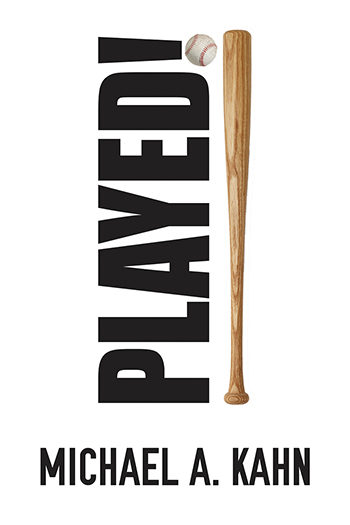“Mike, I have a better idea for your book title.”
I’ve heard that from my editor three times over the years. All three times she was right.
But first, some background:
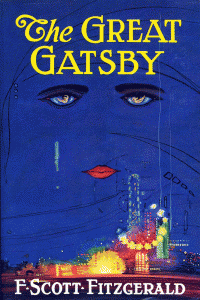 While you can’t tell a book by its cover, you might consider reading a book by its title. Nevertheless, the history of literature reveals that authors are often better at writing novels than naming them. Take, for example, one of the masterpieces of American literature. At various times during its creation, F. Scott Fitzgerald’s manuscript had the following clunky titles: Trimalchio in West Egg; Among Ash-Heaps and Millionaires; On the Road to West Egg; Under the Red, White, and Blue; and The High-Bouncing Lover. Only at the time of publication did Fitzgerald and his publisher finally agree on a title: The Great Gatsby.
While you can’t tell a book by its cover, you might consider reading a book by its title. Nevertheless, the history of literature reveals that authors are often better at writing novels than naming them. Take, for example, one of the masterpieces of American literature. At various times during its creation, F. Scott Fitzgerald’s manuscript had the following clunky titles: Trimalchio in West Egg; Among Ash-Heaps and Millionaires; On the Road to West Egg; Under the Red, White, and Blue; and The High-Bouncing Lover. Only at the time of publication did Fitzgerald and his publisher finally agree on a title: The Great Gatsby.
Another example: When Carson McCullers was twenty-one, she submitted six chapters of her first novel, The Mute, to Houghton-Mifflin. The publisher gave her an advance, renamed her book The Heart Is a Lonely Hunter, and the rest is history.
Here’s a challenge: below are seven pre-publication titles. See if you know the publisher’s final title for each:
- The Last Man in Europe
- Fiesta
- First Impressions
- Strangers from Within
- All’s Well that Ends Well
- Tomorrow Is Another Day
- Whacking Off
The final titles?
- 1984
- The Sun Also Rises
- Pride and Prejudice
- Lord of the Flies
- War and Peace (actually originally published as All’s Well that Ends Well)
- Gone with the Wind
- Portnoy’s Complaint
And now back to me and my titles. The origins of the name of your book are often more mysterious to trace than the origins of the name of your child. The title you start with just somehow feels right–or so you believe when you type Chapter 1 at the top of the second page.
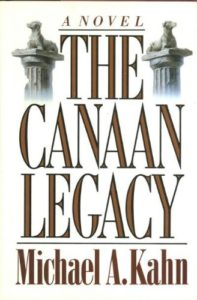 I chose The Canaan Legacy as the title of my first novel, and it was published in hardcover under that title. The origins? A powerful lawyer dies and, to the bafflement of his law partners and his family, a previously unknown codicil to his will establishes a large trust fund for the care and maintenance of a grave in a pet cemetery. The name on the tombstone: Canaan. The mystery: neither he nor his family ever owned a pet, much less one named Canaan. By Chapter 3, the grave has been robbed.
I chose The Canaan Legacy as the title of my first novel, and it was published in hardcover under that title. The origins? A powerful lawyer dies and, to the bafflement of his law partners and his family, a previously unknown codicil to his will establishes a large trust fund for the care and maintenance of a grave in a pet cemetery. The name on the tombstone: Canaan. The mystery: neither he nor his family ever owned a pet, much less one named Canaan. By Chapter 3, the grave has been robbed.
When it came time for the paperback edition, the publisher informed me that the title needed to be changed.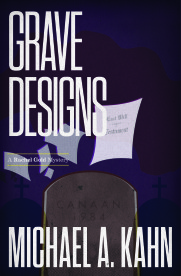
“Why,” I asked.
“Because the current title makes people think it’s a book about the bible.”
“So what do you suggest?”
“Grave Designs.”
“Grave Designs?” I mulled it over. “Not bad. I’m good with that.”
And thus you can now purchase my first novel under the title Grave Designs.
Next was the Rachel Gold mystery submitted to my publisher under what I assumed was a terrific title: Zero Sum. By then, I was lucky be in the good hands of the brilliant Barbara Peters, the Goddess of Editors. One of the featured characters–and I emphasize the word “character”–was Judge Howard Flinch, a quirky, hot-tempered, erratic judge generally viewed by lawyers as the worst jurist in Missouri. But for the case Rachel Gold had–where both the law and facts were against her clients–a quirky, hot-tempered, erratic judge was perhaps the best judge for the case.
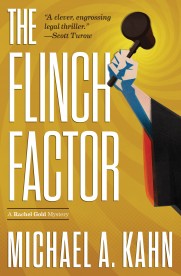 “Mike,” Barbara said to me, “I have a better idea for your book title.”
“Mike,” Barbara said to me, “I have a better idea for your book title.”
“Oh? What do you suggest?”
“The Flinch Factor.”
“The Flinch Factor?” I smiled. “Not bad. I’m good with that.”
And thus you can now purchase the novel formerly known (in manuscript) as Zero Sum under the title The Flinch Factor.
Which brings me at last to my newest novel, which actually began as a screenplay entitled False Pretenses. About halfway through the script, I decided it would work better as a novel. I kept the title False Pretenses until about two-thirds of the way through manuscript, when I changed it to The Cherry Snatch. And thus it remained when I finished the manuscript and submitted it to the Goddess of Editors.
“Mike,” Barbara said to me on the phone, “I love your novel but I don’t like the title. I have a better idea.”
“Really? What do you suggest?”
“Played, with an exclamation mark. Think about it. The title works on all three levels.”
“Played?” I smiled. “Not bad, Barbara. I’m good with that.”
And thus coming this July to a bookstore near you is the novel formerly known as False Pretenses and then as The Cherry Snatch but soon to be known as Played!
